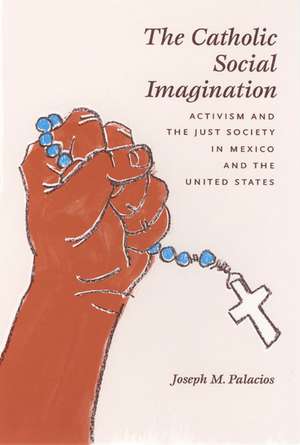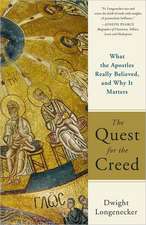The Catholic Social Imagination: Activism and the Just Society in Mexico and the United States: Morality and Society Series
Autor Joseph M. Palaciosen Limba Engleză Paperback – 9 iul 2007
The reach of the Catholic Church is arguably greater than that of any other religion, extending across diverse political, ethnic, class, and cultural boundaries. But what is it about Catholicism that resonates so profoundly with followers who live under disparate conditions? What is it, for instance, that binds parishioners in America with those in Mexico? For Joseph M. Palacios, what unites Catholics is a sense of being Catholic—a social imagination that motivates them to promote justice and build a better world.
In The Catholic Social Imagination, Palacios gives readers a feeling for what it means to be Catholic and put one’s faith into action. Tracing the practices of a group of parishioners in Oakland, California, and another in Guadalajara, Mexico, Palacios reveals parallels—and contrasts—in the ways these ordinary Catholics receive and act on a church doctrine that emphasizes social justice. Whether they are building a supermarket for the low-income elderly or waging protests to promote school reform, these parishioners provide important insights into the construction of the Catholic social imagination. Throughout, Palacios also offers important new cultural and sociological interpretations of Catholic doctrine on issues such as poverty, civil and human rights, political participation, and the natural law.
In The Catholic Social Imagination, Palacios gives readers a feeling for what it means to be Catholic and put one’s faith into action. Tracing the practices of a group of parishioners in Oakland, California, and another in Guadalajara, Mexico, Palacios reveals parallels—and contrasts—in the ways these ordinary Catholics receive and act on a church doctrine that emphasizes social justice. Whether they are building a supermarket for the low-income elderly or waging protests to promote school reform, these parishioners provide important insights into the construction of the Catholic social imagination. Throughout, Palacios also offers important new cultural and sociological interpretations of Catholic doctrine on issues such as poverty, civil and human rights, political participation, and the natural law.
Din seria Morality and Society Series
-
 Preț: 185.66 lei
Preț: 185.66 lei -
 Preț: 185.22 lei
Preț: 185.22 lei -
 Preț: 292.67 lei
Preț: 292.67 lei -
 Preț: 233.50 lei
Preț: 233.50 lei - 5%
 Preț: 228.75 lei
Preț: 228.75 lei -
 Preț: 272.69 lei
Preț: 272.69 lei -
 Preț: 232.52 lei
Preț: 232.52 lei -
 Preț: 249.40 lei
Preț: 249.40 lei -
 Preț: 324.83 lei
Preț: 324.83 lei -
 Preț: 271.85 lei
Preț: 271.85 lei -
 Preț: 299.59 lei
Preț: 299.59 lei -
 Preț: 253.13 lei
Preț: 253.13 lei -
 Preț: 257.00 lei
Preț: 257.00 lei -
 Preț: 276.94 lei
Preț: 276.94 lei -
 Preț: 319.45 lei
Preț: 319.45 lei -
 Preț: 291.90 lei
Preț: 291.90 lei -
 Preț: 221.03 lei
Preț: 221.03 lei -
 Preț: 245.75 lei
Preț: 245.75 lei -
 Preț: 268.41 lei
Preț: 268.41 lei -
 Preț: 272.64 lei
Preț: 272.64 lei -
 Preț: 317.33 lei
Preț: 317.33 lei -
 Preț: 278.60 lei
Preț: 278.60 lei - 16%
 Preț: 211.52 lei
Preț: 211.52 lei - 14%
 Preț: 198.63 lei
Preț: 198.63 lei - 14%
 Preț: 197.31 lei
Preț: 197.31 lei - 22%
 Preț: 481.18 lei
Preț: 481.18 lei - 17%
 Preț: 153.17 lei
Preț: 153.17 lei
Preț: 319.45 lei
Nou
Puncte Express: 479
Preț estimativ în valută:
61.13€ • 64.11$ • 50.89£
61.13€ • 64.11$ • 50.89£
Carte tipărită la comandă
Livrare economică 01-15 aprilie
Preluare comenzi: 021 569.72.76
Specificații
ISBN-13: 9780226645018
ISBN-10: 0226645010
Pagini: 320
Ilustrații: 5 line drawings
Dimensiuni: 152 x 229 x 20 mm
Greutate: 0.45 kg
Editura: University of Chicago Press
Colecția University of Chicago Press
Seria Morality and Society Series
ISBN-10: 0226645010
Pagini: 320
Ilustrații: 5 line drawings
Dimensiuni: 152 x 229 x 20 mm
Greutate: 0.45 kg
Editura: University of Chicago Press
Colecția University of Chicago Press
Seria Morality and Society Series
Notă biografică
Joseph M. Palacios is assistant professor of sociology and Latin American studies at Georgetown University.
Cuprins
Preface and Acknowledgments
List of Abbreviations
Part 1: The Catholic Church Takes on Social Justice as Doctrine
Chapter 1: The Mission and Struggle of Roman Catholics to Create a Just Society
Chapter 2: Political and Cultural Construction of the Catholic Social Doctrine
Part 2: One Church, One Border, Two Justices
Chapter 3: The U.S. Case: Pragmatic andPractice Oriented
Chapter 4: The Mexican Case: Doctrinally Oriented
Part 3: A Faith That Does Justice?
Chapter 5: The Catholic Social Imagination as Doctrine and Practice
List of Abbreviations
Part 1: The Catholic Church Takes on Social Justice as Doctrine
Chapter 1: The Mission and Struggle of Roman Catholics to Create a Just Society
Chapter 2: Political and Cultural Construction of the Catholic Social Doctrine
Part 2: One Church, One Border, Two Justices
Chapter 3: The U.S. Case: Pragmatic andPractice Oriented
Chapter 4: The Mexican Case: Doctrinally Oriented
Part 3: A Faith That Does Justice?
Chapter 5: The Catholic Social Imagination as Doctrine and Practice
Appendix A:Principles of Catholic Social Justice Doctrine
Appendix B:Research Sites and Instruments
Notes
Bibliography
Index
Recenzii
“In this fine-grained ethnographic analysis, Joseph Palacios reveals how the teaching of the Catholic Church on poverty, human rights, immigration, and labor rights is brought to bear on different societies. He shows how differing civil society structures and divergent historical experiences of the Catholic Church in Mexico and the United States explain the contrasting patterns of church-based public engagement and societal influence in the two countries.”--Richard L. Wood, author of Faith in Action: Religion, Race, and Democratic Organizing in America
“Palacios’s book shows that American and Mexican Catholics are both thoroughly Catholic and thoroughly committed to Catholic social teaching, even if they think and act in different ways. Palacios describes the strong and weak points of each group, and what they have to learn from each other. Perhaps this well written and effectively argued book will help them do so. For the rest of us it gives intriguing comparative evidence of the significant role religion plays in today's world.”--Robert N. Bellah, coauthor of Habits of the Heart: Individualism and Commitment in American Life
"This book is recommended to students of Catholic social teaching at every level. It is a provocative text that encourages serious reflection on how to actualize the Church's social teaching within diverse contexts. The models provided here will also help people involved in social reform efforts to better understand one another. . . . The book will be particularly apt in graduate level study of Catholic social teaching and its real-life application."













